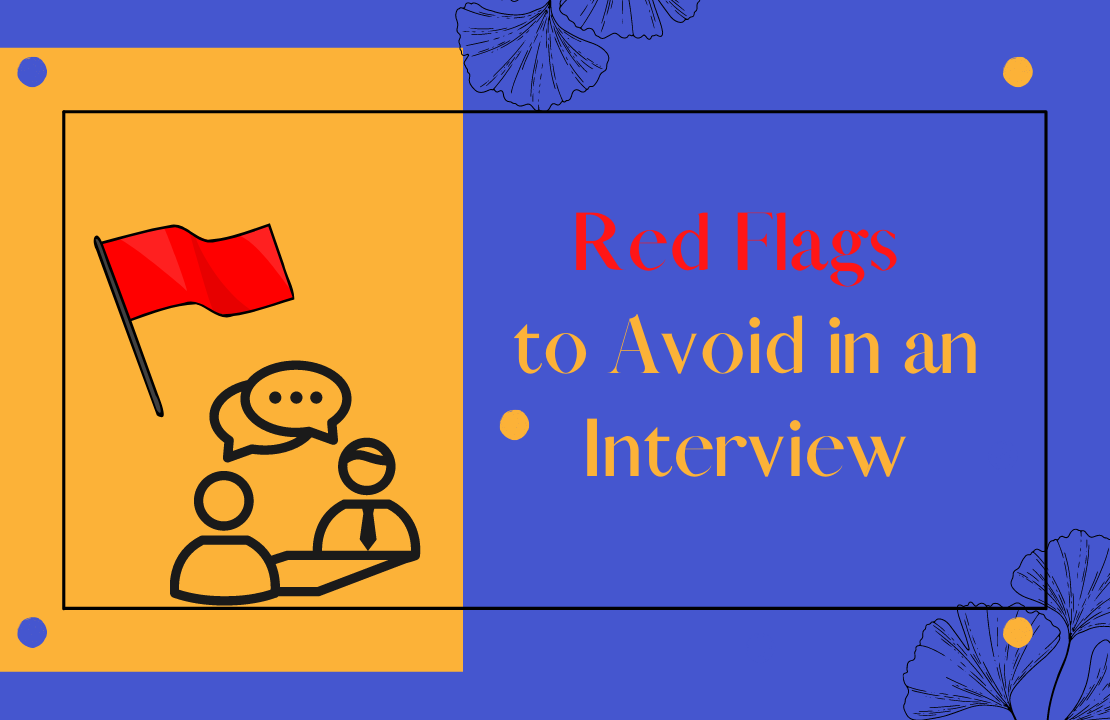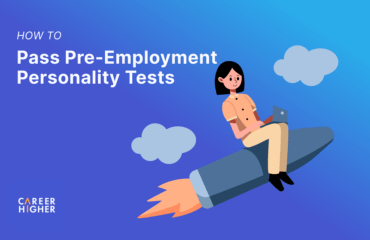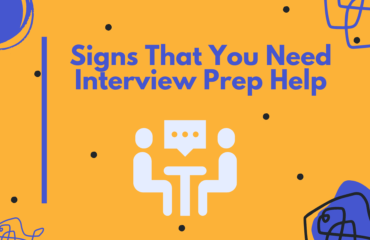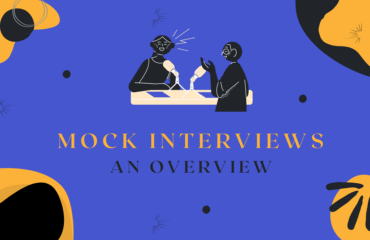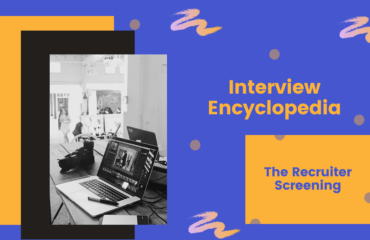Table of Contents
We usually recommend job seekers look out for red flags when researching, applying, and interviewing with an employer. This helps them stay away from working in a toxic workplace. However, it is not only the employees that lookout for red flags, employers do too. In this article, we will have a look at some typical red flags that employers keep an eye on during the interview process. We will further discuss what you should do to avoid them.

Red Flags to Avoid in an Interview
Before the interview
1) Poor communication
Based on the company guidelines, recruiters may or may not respond to your application, depending on the outcome. This is mostly because of the huge number of applications received for every job opening. So, when they inform you about your application moving forward in the hiring process, they obviously expect quick responses. Slow communications from your end may hinder your chances of moving forward. In fact, incorrect grammar and language may also be seen as a drawback. While we understand that language is not proof of your capabilities, strong written communications are important for most jobs. Any carelessness while communicating can be considered a red flag.
We recommend regularly checking your email to revert in time. Additionally, consider using a grammar tool such as Grammarly and Writer to ensure high-quality emails. Make sure you read each email at least twice before sending it out. Remember, your emails represent you as they are your first interaction with your target employer.
2) Rescheduling interview multiple times
In most cases, employers are flexible with interview timings. They either offer options to candidates to choose time slots or request them to suggest some time slots. In emergencies, they are even okay with rescheduling an interview. However, if a candidate asks them to reschedule an interview more than once or twice, it may raise a red flag. This may reflect a lack of organization and management skills.
To avoid this situation, we recommend checking your schedule properly and then suggesting a time and date. If it comes to rescheduling your interview at all, let them know at least 3-5 days in advance, if possible. Once a new date and time are finalized, make sure that you attend the interview.
During the interview
3) Late for the interview
One of the first things that interviewers notice about you in an interview is your adherence to punctuality. They relate it directly to your sincerity towards the job. In many cases, if you are late to your interview, you may even lose your chance to sit for it. If you are allowed to appear before the interview panel even after being late, know that you have already impacted the first impression. This decreases your chances of steering the interview in your favor, no matter how qualified you are for the role.
To make sure you arrive on time, make yourself familiar with the location beforehand. If you are new to the city, identify what route will work best for you and think about your conveyance in advance. If it is an online interview, open the link 15 minutes before and make sure you have a stable internet connection.
4) Inaccurate resume information
Adding inaccurate information to your resume is a big NO-NO. When a recruiter says, “Do you mind walking me through your resume?”, they want to learn more about you, but they have also already seen your resume. So, when you sound unsure, hesitant, or anxious while talking about your work experience, they may be able to sense something fishy. Messed-up dates on a resume or unclear descriptions of roles and responsibilities may be considered a red flag by some employers.
We strongly encourage you to be honest and clear while writing your resume. An accurately written professional experience section is self-explanatory. This reduces your chances of being scrutinized with doubts. Moreover, we recommend you read your resume thoroughly before submitting it to remove any unclear information. Make sure to go through it once again before appearing for an interview.
5) Complaining or gossiping about your previous employer
We understand that some of you have had bad experiences with your previous employers. As a result, you decided to take the next step in your career. While this is a strong reason to change your job, how you present it to the interviewers is essential. Complaining or gossiping about your previous employer is a red flag for a potential employer. They will take it with a pinch of salt, describing you to be unprofessional and disloyal towards your employer.
Even if the only reason you changed your job was the unprofessional behavior of your previous employer, avoid speaking ill about them. Stick to professional reasons like career growth. Let them know how well your expertise and experience align with their requirements, and it is not an opportunity you want to miss. Any questions about your previous employer should be handled with utmost respect and professionalism.
6) Awkward body language
Your body language demonstrates your emotions and feelings in an interview. While it is natural to feel a little uncomfortable and anxious during an interview, it is crucial to control your body language. Imagine yourself as an interviewer sitting with a candidate who is continuously fidgeting with their pen or has wandering eyes. Do you think you will hire that person? In most cases, NO! This is because how you behave in an interview also reflects how you would manage day-to-day operations in your job. A huge chunk of it could be meeting new people every day or attending at least 5 meetings daily. So, candidates with awkward body language are usually viewed as lacking confidence, and employers may want to keep away from them. To help you better understand, here are some signs of awkward body language:
- Awkward hand gestures
- Intense stare
- No eye contact
- No smile
- Weird facial expressions
Preparing for interviews can be challenging, especially when it comes to body language. We suggest practicing as many times as you can before the interview. Firstly, you could record yourself and see how you behave during an interview while answering questions. Based on this, you could change things you don’t believe are working out. Secondly, you could take professional help and practice with an interview coach. Alternatively, you could also have a mock interview with a family member or a friend and make changes based on their feedback.
7) No knowledge of the company
When a candidate expresses interest in working with a company, it is obvious to expect that they know about the company. So, when interviewers interview candidates, they expect to hear about the company. They want to know if you have done your homework and made an effort to learn more about them. This demonstrates a genuine interest and passion for working with them. So, when they see that a candidate has done zero research about the company, they consider it a red flag.
Preparing for an interview is an essential part of your interview process. While preparing for behavioral and competency-based interview questions helps, knowing what your target employer does is equally important. To ensure you know enough about the company, we advise going through their website, social media pages, and publicly available print materials. As a bare minimum, we recommend learning more about their:
- Product and services
- Customers
- Operating geographies
- CSR activities
- Competitors
8) Poor listening skills
When sitting in an interview, active listening skills play a key role. An employer doesn’t want to work with a candidate who is unfocused and inattentive. Zoning out in an interview or asking to repeat a question multiple times are considered to be potential red flags. As a candidate, you should be fully attentive and pay close attention to what each interviewer says.
If you feel you have poor listening skills or tend to lose focus, we advise you to maintain eye contact with your interviewers, avoid interrupting them when they are talking and listen to ask questions. Additionally, we suggest practicing mindfulness to enhance your awareness, thus improving your listening skills. Furthermore, get into a habit of reading to improve your focus. Strengthening soft skills takes time, so the best time to start working on them is now!
9) Prioritizing personal goals
Imagine working for an employer that only focuses on reaching organizational goals with zero interest in their employees’ mental health, professional development, and benefits. Would you want to continue working for them? Of course not! Similarly, candidates who prioritize personal benefits are often passed over by employers. We understand that it is crucial for you to know about your perks and benefits, but it is also important to demonstrate that these are not the only reasons you are joining a company.
To avoid coming across as someone solely interested in fulfilling personal goals, we suggest asking questions about the company, culture, and growth. Furthermore, focus on professional development and growth aligned with organizational goals. When discussing compensation and benefits, adopt the best practices without being projected as someone solely looking for a higher compensation package.
10) Engaging in a controversial conversation
As mentioned above, your interview experience is a reflection of your personality at work. Discriminatory opinions are not only red flags but also illegal in most countries. In some cases, it may also lead to you being blacklisted by a company. So, we highly recommend you keep away from any controversial comments and opinions. In fact, to create a strong impression, you could ask about their diversity and inclusion best practices.
11) Not asking questions
Questions form an integral part of interviews. Asking questions during an interview reflects your interest in the company and enthusiasm to work in the role. If you don’t ask questions about the company, role, or culture, it may demonstrate a disinterest and a lack of motivation. We strongly recommend putting in the effort to ask questions as it is also a good opportunity for you to learn if the role and company are aligned with your personal and professional values.
After the interview
12) Not sending a thank-you note
While we may think that not sending a thank-you note isn’t a big deal, some employers may think otherwise. According to research, about 80% of employers find thank-you notes helpful while making a decision. This means that a majority of them expect candidates to send these after an interview. However, the same research found that only about 24% of candidates send these. So, not following up effectively after an interview may cost you your chances of being hired for your dream role.
We strongly advocate in favor of adding a thank-you note after every interview. This allows you to connect with your prospective employer once more and demonstrate your keen interest in working with them. It also reflects your ability to develop and maintain relationships and communicate effectively. In most cases, it also allows you to gain a competitive advantage as many candidates don’t send effective follow-up notes.
In the quest to find the best candidates for their company, employers usually keep an eye on all of the above. Thus, to enhance your chances of moving forward in the hiring process for your desired position, we encourage you to keep a check on the abovementioned parameters. If you require any support to prepare well for an upcoming interview, we are happy to help.
